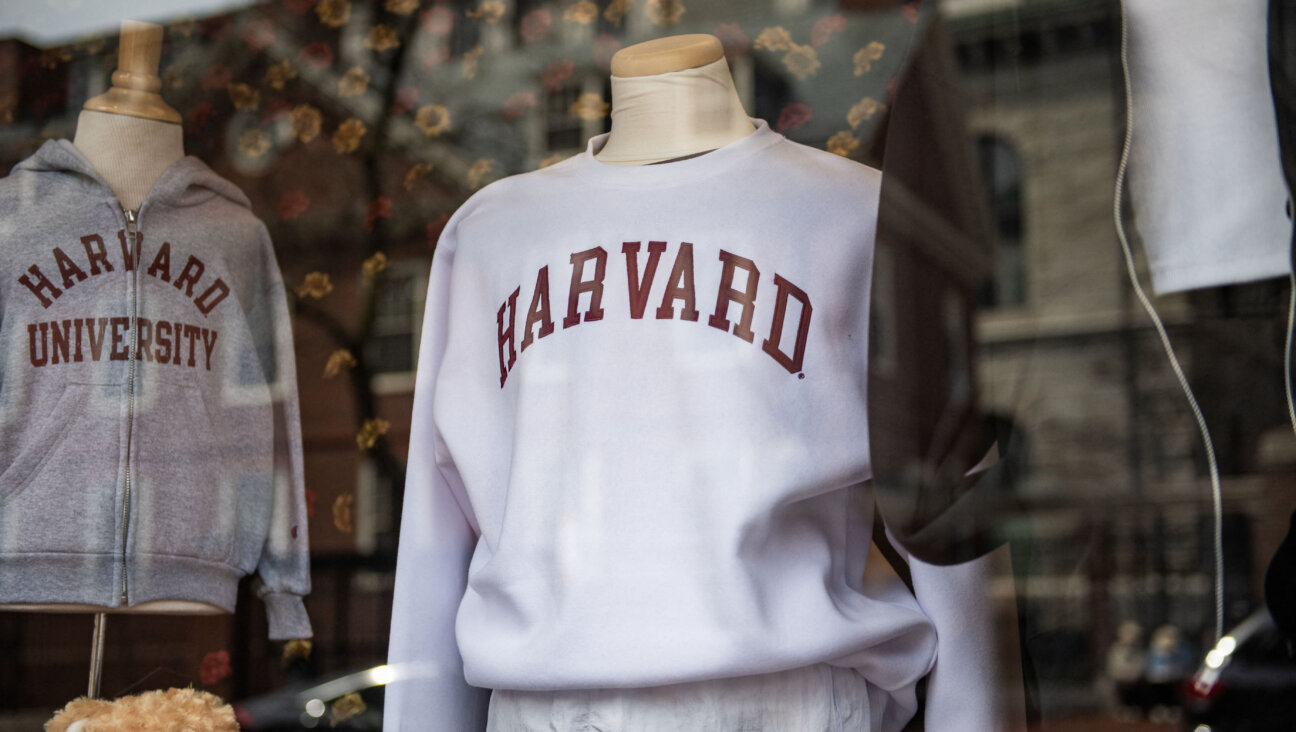What Makes A Macher?

Fixers? Brokers?: Whatever their English appellations, Abraham Foxman and David Saperstein are certainly machers. Image by gETTY IMAgES
Most of us know what a macher (with the “ch,” as in Bach) is, but what do you call one in English?

Fixers? Brokers?: Whatever their English appellations, Abraham Foxman and David Saperstein are certainly machers. Image by gETTY IMAgES
This question came to mind recently, in connection with the Holyland real estate scandal in Jerusalem, whose suspects include city mayor Uri Lupolianski and ex-prime minister Ehud Olmert. The key player in the affair, it would seem, is a shadowy figure named Meir Rabin, who has been referred to repeatedly by the Israeli media as the macher who coordinated everyone. Trying to find an equivalent for this Yiddish word in English, the Israeli news service Ynet called Rabin the “man who got things done.” Haaretz journalist Amir Oren had this to say about the affair:
“Its kind of network has no head, only a nerve center: the mediator, the macher. He has to touch all the various bases one after the other — engineers, officials, government leaders — in order to oil the creaking wheels of the mechanism, both large and small.”
Someone who gets things done? A nerve center? A mediator? An oiler of wheels? Here are some other attempts to define macher, taken from various print and online Yiddish-English lexicons: “Macher — a broker, an agent; a shrewd man; a swindler.” “Macher — an influential person; a fixer.” “Macher — a person who makes things happen; a big shot.” “Macher — a person with access to authorities, a man with contacts.” “Macher — a mover and shaker.” “Macher — a wheeler-dealer.”
Most of these definitions fall short of putting their finger on what makes a macher a macher. He is indeed someone who gets things done, but so is any competent CEO. He may be a nerve center, but a switchboard operator is, too. Mediators come in all varieties, of which a macher is only one. Oilers or greasers of wheels resort to bribery, which a macher does not necessarily do. Brokers, agents and swindlers may be machers, but machers needn’t be brokers, agents or swindlers. And while a successful macher is certainly influential, so is a successful author or intellectual.
Machers make things happen? Theater directors and symphony conductors do, too. They’re big shots? Some are, but not as big as, in their own fields, Tiger Woods or Warren Buffett. Every friend of a mayor or police chief has access to authority, and every Facebook user has plenty of contacts. Einstein was a mover and shaker of the world, but he was definitely not a macher.
That leaves us with “fixer” and “wheeler-dealer.” A fixer is not very different from an oiler of wheels. He is someone who, in return for a price, will extract a needed favor for you from someone else in return for another price. A macher may do this, too, but because the fixer is by definition engaged in activities that he would not want to be publicly known, he always operates behind the scenes. Machers, on the other hand, are often — although they don’t have to be — highly conspicuous. To call someone in Yiddish a gantser makher is a sarcastic way of referring to a person who flaunts being involved in 100 different things.
We’re down now to “wheeler-dealer,” which is perhaps the closest equivalent of makher that English has. This is a curious word of uncertain origin, dating to the early 1940s and belonging to a large class of words (for example, mumbo-jumbo, palsy-walsy, honky-tonk, etc.) known as reduplicatives. I myself had always supposed the term to have originated in the game of poker, in which the dealer turns or “wheels” as he distributes the cards to those seated around the table. Yet this does not seem to be the opinion of most researchers, who think it more likely that the wheel in question is a roulette wheel and that a wheeler-dealer was originally a gambler who played both cards and roulette. Two other explanations I’ve come across are 1) The first wheeler-dealers were car dealers who talked customers into buying “wheels”; 2) They were dealers in the 19th-century London fish market, into which the fish were wheeled before being sold.
Is a wheeler-dealer the same as a macher? Almost, but not quite. The main difference, I would say, is that “wheeler-dealer” suggests someone operating on many fronts and levels for his own benefit, whereas a macher may act on behalf of an organization or cause. Although you probably wouldn’t, for example, call Abraham Foxman of the Anti-Defamation League, or David Saperstein of the Religious Action Center of Reform Judaism, a wheeler-dealer, both are definitely machers in Jewish terms.
Both “wheeler-dealer” and macher may have negative undertones, but while most people would agree that the world could do nicely without wheeler-dealers, there is a social necessity for at least some kinds of machers. The Yiddish verb makhn means both “to make” and “to do,” and when one Jews asks another, “Vos makhstu?” he is simply asking “What’s up?” or “What’s doing?” A makher is someone who, often with no official position or title, makes it his job to get other people to do things, without being too finicky about the means he employs. Sometimes he’s a force for the better, sometimes for the worse. There’s really no exact word for it in English.
Questions for Philologos can be sent to [email protected]
The Forward is free to read, but it isn’t free to produce

I hope you appreciated this article. Before you go, I’d like to ask you to please support the Forward.
Now more than ever, American Jews need independent news they can trust, with reporting driven by truth, not ideology. We serve you, not any ideological agenda.
At a time when other newsrooms are closing or cutting back, the Forward has removed its paywall and invested additional resources to report on the ground from Israel and around the U.S. on the impact of the war, rising antisemitism and polarized discourse.
This is a great time to support independent Jewish journalism you rely on. Make a Passover gift today!
— Rachel Fishman Feddersen, Publisher and CEO
Most Popular
- 1

News Student protesters being deported are not ‘martyrs and heroes,’ says former antisemitism envoy
- 2

News Who is Alan Garber, the Jewish Harvard president who stood up to Trump over antisemitism?
- 3

Fast Forward Suspected arsonist intended to beat Gov. Josh Shapiro with a sledgehammer, investigators say
- 4

Opinion What Jewish university presidents say: Trump is exploiting campus antisemitism, not fighting it
In Case You Missed It
-

Culture In Pope Francis, a voice for interfaith dialogue and against antisemitism
-

Fast Forward Israeli army fires deputy commander after finding ‘operational errors’ in killing of 15 Gazans
-

News Pope Francis, who advanced church’s relationships with Jews, dies at 88
-

Fast Forward ‘F–k Israel’ message displayed at Coachella music festival and streamed to millions
-
Shop the Forward Store
100% of profits support our journalism
Republish This Story
Please read before republishing
We’re happy to make this story available to republish for free, unless it originated with JTA, Haaretz or another publication (as indicated on the article) and as long as you follow our guidelines.
You must comply with the following:
- Credit the Forward
- Retain our pixel
- Preserve our canonical link in Google search
- Add a noindex tag in Google search
See our full guidelines for more information, and this guide for detail about canonical URLs.
To republish, copy the HTML by clicking on the yellow button to the right; it includes our tracking pixel, all paragraph styles and hyperlinks, the author byline and credit to the Forward. It does not include images; to avoid copyright violations, you must add them manually, following our guidelines. Please email us at [email protected], subject line “republish,” with any questions or to let us know what stories you’re picking up.
















